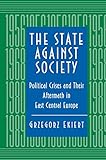The State against Society : Political Crises and Their Aftermath in East Central Europe / Grzegorz Ekiert.
Material type: TextPublisher: Princeton, NJ : Princeton University Press, [1996]Copyright date: ©1997Edition: Course BookDescription: 1 online resource (448 p.)Content type:
TextPublisher: Princeton, NJ : Princeton University Press, [1996]Copyright date: ©1997Edition: Course BookDescription: 1 online resource (448 p.)Content type: - 9780691011134
- 9781400822041
- 306.2/0943 320.943
- HX240.7.A6E44 1996
- online - DeGruyter
- Issued also in print.
| Item type | Current library | Call number | URL | Status | Notes | Barcode | |
|---|---|---|---|---|---|---|---|
 eBook
eBook
|
Biblioteca "Angelicum" Pont. Univ. S.Tommaso d'Aquino Nuvola online | online - DeGruyter (Browse shelf(Opens below)) | Online access | Not for loan (Accesso limitato) | Accesso per gli utenti autorizzati / Access for authorized users | (dgr)9781400822041 |
Frontmatter -- Contents -- Preface and Acknowledgments -- CHAPTER 1. Introduction: Political Crises, Mobilization, and Demobilization in East Central Europe -- Part I. The Political Crisis and Its Aftermath in Hungary, 1956-1963 -- CHAPTER 2. The Party-State and Society during the Hungarian Revolution -- CHAPTER 3. The Soviet Invasion and the Defeat of the Revolution -- CHAPTER 4. The Political Crisis, Demobilization, and Regime Reequilibration in Hungary -- Part II. The Political Crisis and Its Aftermath in Czechoslovakia, 1968-1976 -- CHAPTER 5. The Party-State and Society during the Prague Spring -- CHAPTER 6. The End of Socialism with a Human Face -- CHAPTER 7. The Political Crisis, Demobilization, and Regime Reequilibration in Czechoslovakia -- Part III. The Political Crisis and Its Aftermath in Poland, 1980-1989 -- CHAPTER 8. The Party-State and Society during the Solidarity Period -- CHAPTER 9. Poland under Martial Law and After -- CHAPTER 10. The Political Crisis and the Failure of Demobilization and Regime Reequilibration -- CHAPTER 11. Conclusions: Patterns and Legacies of Political Crisis, Demobilization, and Regime Reequilibration in East Central Europe -- Notes -- Bibliography -- Index
restricted access online access with authorization star
http://purl.org/coar/access_right/c_16ec
Classical images of state-socialism developed in contemporary social sciences were founded on simple presuppositions. State-socialist regimes were considered to be politically stable due to their pervasive institutional and ideological control over the everyday lives of their citizens, impervious to reform and change, and representative of extreme political and economic dependency. Despite their contrasting historical experiences, they have been treated as basically identical in their institutional design, social and economic structures, and policies. Grzegorz Ekiert challenges this notion in a comparative analysis of the major political crises in post-1945 East Central Europe: Hungary (1956-63), Czechoslovakia (1968-76), and Poland (1980-89). The author maintains that the nature and consequences of these crises can better explain the distinctive experiences of East Central European countries under communist rule than can the formal characteristics of their political and economic systems or their politically dependent status. He explores how political crises reshaped party-state institutions, redefined relations between party and state institutions, altered the relationship between the state and various groups and organizations within society, and modified the political practices of these regimes. He shows how these events transformed cultural categories, produced collective memories, and imposed long-lasting constraints on mass political behavior and the policy choices of ruling elites. These crises shaped the political evolution of the region, produced important cross-national differences among state-socialist regimes, and contributed to the distinctive patterns of their collapse.
Issued also in print.
Mode of access: Internet via World Wide Web.
In English.
Description based on online resource; title from PDF title page (publisher's Web site, viewed 30. Aug 2021)


